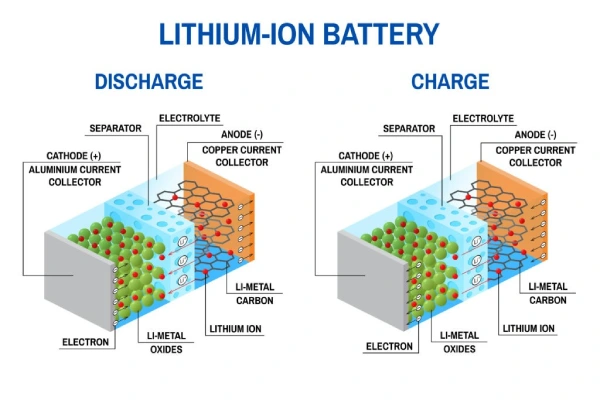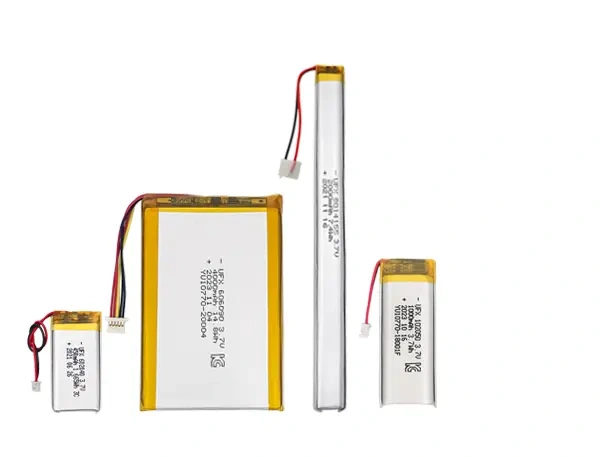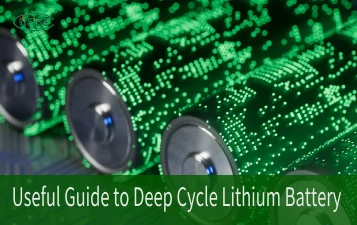Part 1. Learn about lithium battery short circuit?
To understand a lithium battery short circuit, we first need to understand how the battery works.
How lithium batteries work

Lithium batteries convert stored chemical energy into electrical energy. During normal operation, an electrochemical reaction occurs at the battery’s two electrodes: a reduction reaction occurs at the cathode, and an oxidation reaction occurs at the anode.
During the discharge process, the positive electrode is the cathode, and the negative electrode is the anode. During the charging process, the roles of the two poles are reversed; the positive pole is the anode, and the negative pole is the cathode.
An electrode releases electrons into the circuit. At the same time, the other electrode picks up electrons from the circuit. This overall favorable chemical reaction drives the flow of electricity in the circuit.
Li-ion battery short circuit
The so-called short circuit means that electrons do not flow through the circuit connected to the electrical equipment but directly flow between the two electrodes. Since these electrons do not have to do mechanical work, the resistance is very small.
The chemical reaction accelerates, and the battery begins to self-discharge, losing chemical energy without doing any useful work. The extremely strong current during a short circuit will cause the battery resistor to heat (Joule heat), which will likely damage the device.
A shorted battery is a bad failure. The chemical energy stored in the battery is lost as heat and cannot be used by the device. At the same time, a short circuit can also cause severe heating. This will reduce the performance of the battery material and may even cause a fire or explosion by triggering thermal runaway.
Part 2. Why do lithium batteries short circuit?
There are many reasons for the short circuit of lithium batteries. The following are common causes of short circuits of lithium batteries.
- Lithium battery electrolyte leakage The internal sealing of the battery is poor, the electrolyte composition is inappropriate, the battery is damaged externally, etc.
- Lithium battery electrode material damage Improper operation, material quality problems, external damage to the battery, etc.
- The battery separator is damaged Improper operation, separator quality problems, external damage to the battery, etc.
- The lithium battery electrode is in contact with external metal Improper design of the lithium battery casing, quality issues with the casing material, external damage to the battery, etc.
- Short circuit during charging Improper design of lithium battery chargers, charger quality issues, incorrect use of chargers, etc.
- Short circuit during transportation Lithium batteries are squeezed, hit, etc., during transportation.
- Incorrect use When lithium-ion batteries are exposed to special temperatures and humidity or are subject to impact, metal friction, or poor contact, the instantaneous current may be excessive, which may cause the battery to short-circuit and explode.
Part 3. What are the dangers of short circuiting lithium batteries?
1. Battery leakage
When the temperature inside the lithium battery rises slowly, the outer shell melts. Currently, the protective layer cannot provide protection, resulting in the leakage of corrosive electrolytes.
2. Lithium battery spontaneous combustion
When a lithium battery is short-circuited, a spark can ignite the electrolyte instantly. This is because the electrolyte consists of flammable liquid. The burning electrolyte will ignite the plastic body and cause the lithium battery to burn. If there are flammable materials around the lithium battery, it will cause a fire.
3. Explosion
The temperature inside the lithium battery rises quickly because the outer shell does not gradually melt when the temperature rises slowly. As a result, the internal space of the battery is insufficient to accommodate the expanding gas under heating. Lithium batteries can explode due to excessive pressure.
Part 4. How does Ufine avoid short circuits of lithium batteries?

During the production and manufacturing process of lithium-ion batteries, excessive impurities in raw materials, unqualified manufacturing processes, and inaccurate designs related to battery safety protection will all cause substandard lithium battery quality. This increases the chance of the lithium battery exploding.
As a world-renowned lithium-ion battery manufacturer, Ufine, to prevent short circuits during the lithium battery manufacturing process, strengthens battery quality control, selects high-quality materials, and designs reasonable production processes to ensure the safety performance of batteries.
1. Electrolyte leakage
Ensure that the interior of the lithium battery is well sealed, select appropriate electrolyte components, and conduct strict quality control and testing.
2. Damage to electrode material
Ufine strengthens quality control in the lithium battery production process. Ensure the integrity and stability of electrode materials.
3. Damaged diaphragm
Ufine Battery selects high-quality separator materials and strengthens quality control during production. Ensures diaphragm integrity and stability.
4. The electrode is in contact with external metal
Ufine has always selected suitable shell materials and well-designed shell structures, strengthened quality control during the production process, and ensured the insulation performance of the battery exterior.
5. Short circuit during transportation
Ufine Battery selects appropriate packaging materials and transportation methods to strengthen protection measures while transporting lithium batteries.
Part 5. Summary
Lithium-ion batteries may encounter safety risks such as short circuits in actual use. Ufine Battery has designed safety tests such as extrusion, acupuncture, short circuit, overcharge and over-discharge, high and low temperature, etc. In addition, when using lithium batteries, you should choose a charger that meets safety standards and use the correct charging method.
Related Tags:
More Articles

Overview of Deep Cycle Lithium Battery
In this article, we explore the life, voltage, capacity, and charging considerations of deep cycle lithium batteries.
How Long do Lithium Batteries Last?
How long do lithium batteries last? we will explore the factors that influence the lifespan of lithium batteries and provide insights into their longevity.
How to Choose the Best LiFePO4 Battery?
Choose LiFePO4 batteries for superior performance, safety, and versatility in EVs, UPS, and backup power. This guide helps you make informed decisions.
Get 12v Lithium Car Battery As a Power Source for the Ride
Make the right choice for your vehicle's battery needs by installing a 12 volt lithium car battery. You will enjoy maintenance-free longevity with this change.
Everything About A Small Lithium Ion Battery
Discover the features, uses & future potential of a small lithium ion battery. A compact and tiny powerhouse ideal for smartphones, wearables, drones & more.





